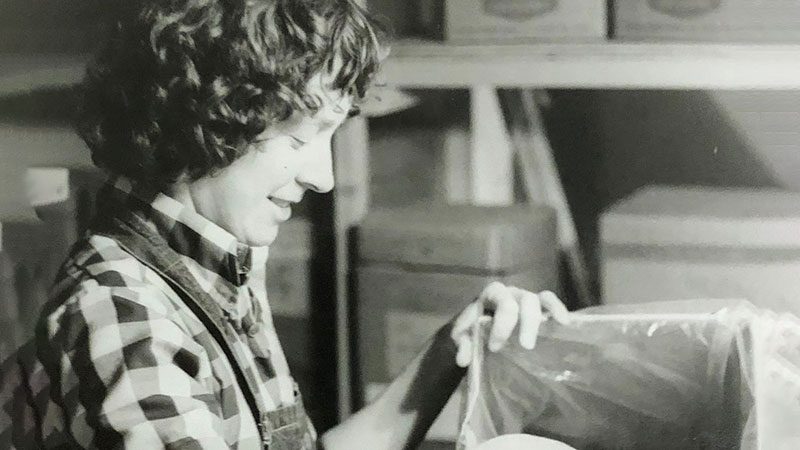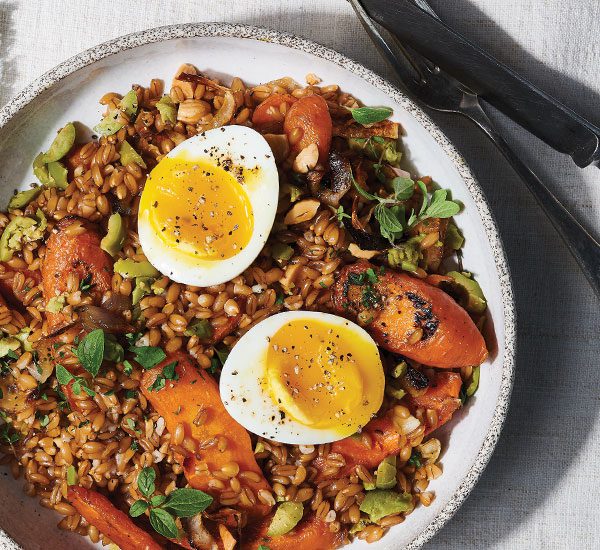Poet of the Farmland Fund
This article was originally published in September 2023

Jody Aliesan stocked produce during her early years working at PCC, as one of 12 employees in the co-op’s fledgling single store. In later years she led the PCC Farmland Fund, a nonprofit land trust she co-founded to protect organic farmland. (It lives on as a separate organization, the Washington Farmland Trust.)
The backdrop to her 30-year PCC career, though, was her life’s work as a poet, and her ferociously principled, passionate fight for equal rights for all.
Aliesan moved to Seattle in 1970 with then-partner Randy Lee, noting with delight in her diary that Lee was starting a job on his 24th birthday that would be “satisfying, interesting, socially meaningful” as assistant manager for PCC. (Lee stayed for 46 years before retiring as chief financial officer.)
A folksinger before she focused on poetry, her own causes were multifaceted and sometimes intertwined with her creative work. A groundbreaking organizer, fundraiser, war protester, environmentalist, feminist and more, her obituary summed it up like this: She dedicated her life to “telling the truth, and speaking for those who cannot speak for themselves.”
Aliesan’s papers, donated to the University of Washington archives after her death in 2012, show her advocacy in political and social movements “including the Civil Rights movement of the 1960s, the second wave feminist movement in the 1970s, and the peace movement from the 1960s to the 2000s,” summarized UW’s biographical note. She worked as a writer and researcher for the Associated Students of the University of Washington, it said, but considered herself “an outside agitator.” Her work on the status of women at the university led to a class-action lawsuit and breakthrough changes.
In a neat, compact script that practically hums with energy, Aliesan recounted daily efforts in the early ’70s such as telling a newspaper’s editorial board how the paper demeaned women by referring to powerful women by their first names (but men by their last names) and commenting on their looks. She told them that those subtle indignities, from the board’s position of power, gave others implicit permission to take women less seriously too.
“They all complained about our “humorlessness,” but I expected that,” she wrote in her diary. “We’re supposed to laugh at our oppression, to ease the conscience of the oppressor.”
Aliesan shared information on her “urban homestead” in North Seattle in the early 1980s through funding by the U.S. Department of Energy, which considered the house a technology demonstration project, and wrote a conservation-oriented column related to that lifestyle for The Seattle Times. In it, she gave still-relevant advice on gardening and composting, harvesting honey from backyard bee hives, eating tofu to help move away from a “meat-centric” diet, and buying clothes at thrift shops (except for a few items, like Birkenstocks sandals, which she purchased new. “When the soles wear down, I buy new ones for $4.50 at M.J. Feet in the University District and glue them on myself.”)
Even her self-selected name held meaning. Describing her plans to change it legally, she wrote that she wanted a surname “of my own choice, one that is neither my father’s nor my former husband’s. I am doing this as a withdrawal of consent from the patriarchal naming system, wherein a woman achieves identity and “legitimacy” only through blood relationship to male lineage as a daughter or through legal attachment to male lineage as a wife.” Aliesan, she wrote, was Anglo-Saxon—“the ancestry of both my foremother and my forefather”—meaning “to set free.”
Originally, the PCC produce job was meant to support Aliesan’s true calling as a poet. (She published 11 books and many other individual poems.) But it inevitably reflected her drive and passions too, her belief that—as she signed off so many messages to PCC members—“we are stronger when we work together.”

